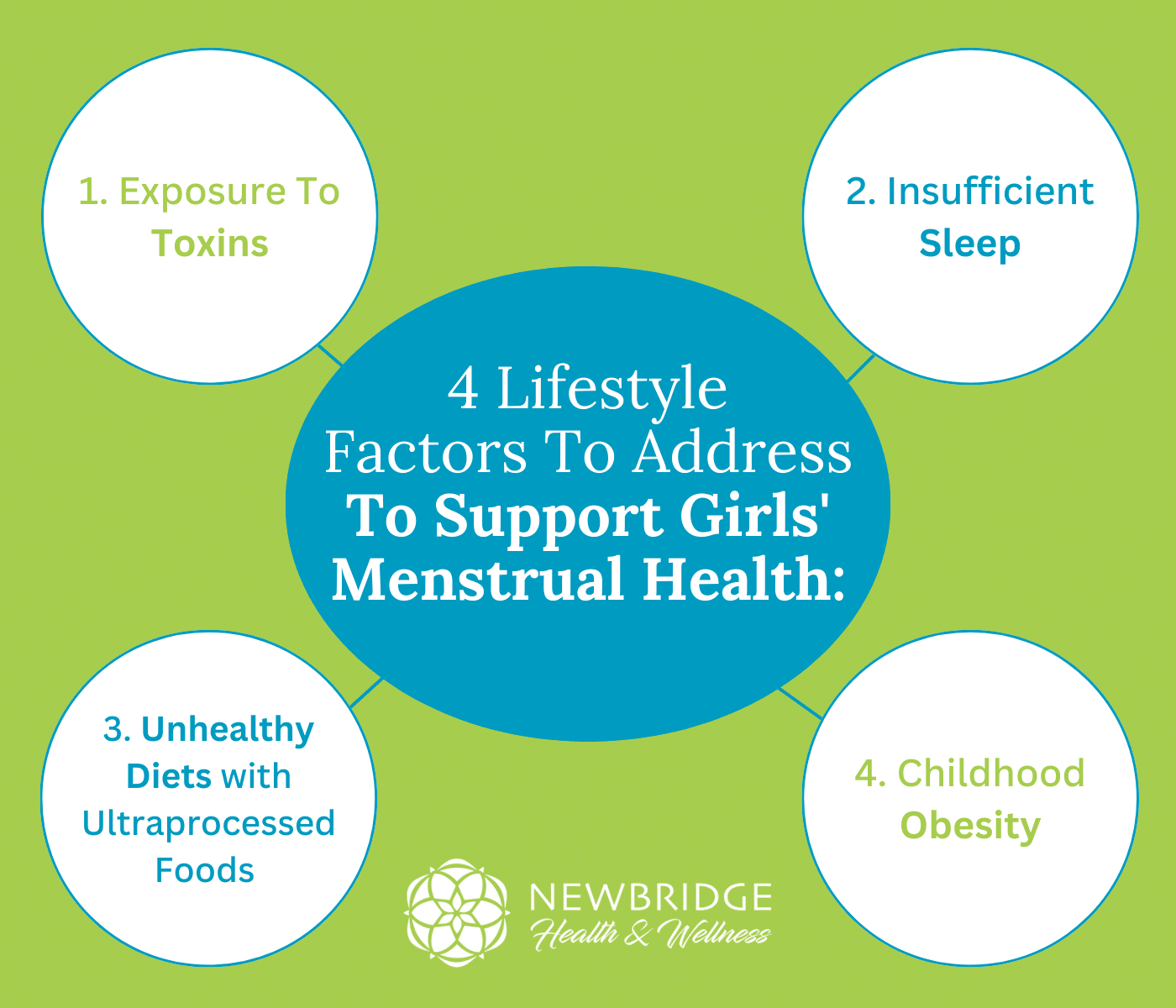The onset of puberty marks a significant milestone in a young girl’s life, signaling the beginning of physical and hormonal changes that lead to adulthood. However, a recent study shows that an alarming trend has emerged in recent decades: girls are beginning puberty earlier than ever before. Girls are also experiencing longer periods of menstrual irregularity.
When a girl starts her period earlier, research suggests that this can pose long-term health issues for her, such as higher risks for certain cancers, cardiovascular issues, mood disorders, and infertility later in life. In other words, starting puberty earlier is not simply problematic at the time of onset.
As a clinic of Functional Medicine providers, we see firsthand the complexities of this issue and the various factors that researchers believe may be contributing to this phenomenon. Here we explore some areas of lifestyle – as mentioned by this study’s lead researcher – that parents can start to address in order to promote health around menstruation: exposure to toxins, insufficient sleep, unhealthy diets consisting of ultra processed food, and childhood obesity. We outline actionable steps parents can take to mitigate risk, along with some bonus tips for to-be-parents for the pre-conception and pregnancy phases of life, which do, indeed, have an impact on the health of a future child.
Need help improving your child’s health? We specialize in functional medicine and have decades of combined experience in pediatrics. Schedule a free intake phone consultation to get started.
1. Exposures to Toxins
One factor brought to light from this study is exposure to environmental toxins. Our modern world is replete with endocrine-disrupting chemicals (EDCs) found in everyday products such as plastics, cosmetics, pesticides, and household cleaners. These chemicals, including bisphenol A (BPA), phthalates, and parabens, can mimic or interfere with the body’s hormones, particularly estrogen, which is a key player in menstrual health.
Steps Parents Can Take:
- Curb or minimize use of plastic: Opt for BPA-free plastics and avoid using plastic containers, altogether, if possible, for food storage, especially when cooking or reheating food. Glass, stainless steel, or BPA-free options are safer alternatives.
- Use natural cleaning supplies: Replace conventional cleaning products with natural or homemade alternatives that do not contain harmful chemicals. Check out the Environmental Working Group’s Guide to Healthy Cleaning to determine the safety rating of various cleaning products used throughout your home.
- Buy organic produce: Whenever possible, choose organic fruits and vegetables to reduce exposure to pesticides. Washing and peeling non-organic produce can also help minimize pesticide residue.
2. Not Enough Sleep
Sleep is a fundamental aspect of a child’s health and development. Unfortunately, our modern lifestyles often disrupt sleep patterns, especially with children who are spending excessive time on electronic devices and engaging in activities that push bedtimes later.
Steps Parents Can Take:
- Establish a consistent sleep routine: Create and maintain a regular bedtime schedule that ensures your child gets the recommended amount of sleep for their age. The CDC recommends 9-12 hours of sleep for children ages 6-12 and 8-10 hours for children ages 13-18.
- Limit screen time before bed: Reduce exposure to screens at least one hour before bedtime to help promote better sleep. Encourage calming activities such as reading or taking a warm bath instead.
- Create a restful sleep environment: Ensure your child’s bedroom is conducive to sleep by keeping it cool, dark, and quiet. Consider using blackout curtains and white noise machines if necessary. For additional steps you can take to support healthy sleep for your family, check out these tips.

3. Unhealthy Diet Consisting of Processed Food
The modern diet, rich in ultra processed foods, may be playing a significant role in early puberty. Foods that are high in sugars, unhealthy fats, and artificial additives, but low in essential nutrients, offer little-to-no nutritional value to our bodies. An unhealthy diet can lead to insulin resistance and increased levels of body fat, which are linked to dysfunctional hormonal function.
Steps Parents Can Take:
- Prioritize whole foods: Focus on providing a diet rich in fresh fruits and vegetables, whole grains, fresh lean proteins, and healthy fats (olive oil, avocado, oily fish, nuts and seeds). Minimize the intake of processed and fast foods.
- Read food labels: Be vigilant about reading food labels to avoid products high in added sugars, unhealthy fats, and artificial additives. When choosing pre-packaged foods, look for options that have a short list of ingredients that are familiar.
- Involve kids in meal prep: Encourage children to help with meal planning and preparation, which can increase their interest in and enjoyment of healthy foods.
4. Obesity in Children
Childhood obesity is another critical factor discussed in relation to early puberty in girls, including high Body Mass Index (BMI). Excess body fat can lead to higher levels of leptin, a hormone that plays a role in the regulation of puberty. Higher leptin levels have been associated with earlier onset of menstruation and other puberty markers.
Steps Parents Can Take:
- Promote physical activity: Encourage at least 60 minutes of physical activity daily. This can include sports, playing outside, walking, biking, or dancing.
- Limit sugary beverages: Reduce the consumption of sugary drinks like sodas, juices, and sports drinks. Offer water first or foremost.
- Encourage healthy snacking: Provide healthy snack options such as fruits, vegetables, nuts and seeds instead of processed snacks high in sugars and unhealthy fats. For healthier packaged snack options, check out this video from our Functional Nutrition Provider.
Bonus Tips for Pre-Conception and Pregnancy Phases
If you are planning to have children but have not yet conceived, you can begin focusing on the healthy development of your children now. Beyond the steps outlined above, here are some additional tips to consider during the pre-conception and pregnancy phases.
- Optimize nutrient intake: Work with a healthcare provider to identify and address any nutrient deficiencies. Ensuring adequate levels of key nutrients like folate, iron, and vitamin D can support reproductive health and prepare your body for pregnancy.
- Balanced microbiome: Support a healthy gut microbiome by consuming probiotics through foods like fermented vegetables or supplements. A balanced microbiome can positively affect maternal and fetal health.
- Environmental awareness: Reduce exposure to environmental pollutants by avoiding areas with high levels of air pollution and being mindful of the quality of indoor air in your home. Use air purifiers and houseplants to improve air quality.
- Mental health care: Prioritize mental health by seeking support when needed. Counseling, support groups, and mindfulness practices can help manage stress and emotional changes during pregnancy.
For more information check out these two blog posts on our website: “Eating for Two: How Nutrition During Pregnancy Affects Child Development” and “Tips for a Healthy Pregnancy”
The trend of girls starting puberty earlier is a multifaceted issue that research suggests is influenced by factors like environmental toxins, insufficient sleep, unhealthy diets, and obesity. Addressing these concerns from a Functional Medicine perspective involves a holistic approach to health and well-being. By reducing toxin exposure, ensuring adequate sleep, promoting a nutritious diet, and encouraging physical activity, we can support healthier development of young girls and potentially reduce the risk of early puberty.
Would you like to know more about functional medicine and how it could help your child’s health? Schedule a 15-minute phone consultation. It’s FREE.


